完整版专四英语语法考点
专四语法点

专四语法总结(13)十五、复合句——副词性(状语)从句副词在句中起状语作用,故如果起状语作用的部分为一个句子,那么该句便是副词性从句,也称状语从句。
状语从句可细分为:时间、地点、条件、原因、让步、目的、结果、比较、方式等。
状语从句的测试重点为:考查考生对主从句之间逻辑意义关系的把握,看其是否能选择正确的从属连词。
1.条件状语从句的常考知识点(1)if与unless的用法。
if和unless都是引导条件状语从句的连词,考生应尤其注意unless的用法,因为它表示反面条件,相当于if not“如果不”、“除非”。
如:In debating, one must correct the opponent’s facts, deny the relevance of his proof, or deny that what he presents as proof, if relevant, is sufficient.(2)复合连词as long as,so long as,as far as,on condition that,in the event that;动词及分词provided(that),providing(that),given that, suppose/supposing(that),assuming,say等引导条件状语从句。
如:You can arrive in Beijing earlier for the meeting provided you don’t mind taking the night train.Assuming he is diligent in his studies at ordinary times, he is sure to pass the test.In the event that she has not been informed, I will tellher. (如果……)You can go swimming on condition that you don’t go too farfrom the river bank. (如果……)Suppose it rained, we would still go. (假如……) Say it were true, what would you do about it? (假如……)(3)祈使句表示条件。
英语专四语法复习内容

英语专四语法复习内容想要通过英语专四考试,就必须掌握英语专四的语法。
那么英语专四的语法有哪些呢?下面由店铺为大家整理的英语专四语法内容,希望大家喜欢!英语专四语法内容一 There be 结构1. There be结构There were very few people left when we got there.There have been many such incidents.Nearby there had been a fight in full progress.也可以是情态动词 +beThere can be very little doubt about his guilt.There may always be instances about which we are uncertain. There ought to / should be some instructions on the lid.还可以是There +情态动词+ be 的完成时There may have been an accident.If the criminal had come this way, there would be / would have been footprints. There should / ought to have been someone on duty all the time.2. There + 半动词+ be,这里很少用完成体形式.There is certain to be trouble at the factory.There is sure / likely to be some rain tonight. There seems / appears to be no doubt about it.3. There be结构也可有被动式,这类there be结构有些可以与there be结构的一般形式相互转换。
2023年英语四级考试重点
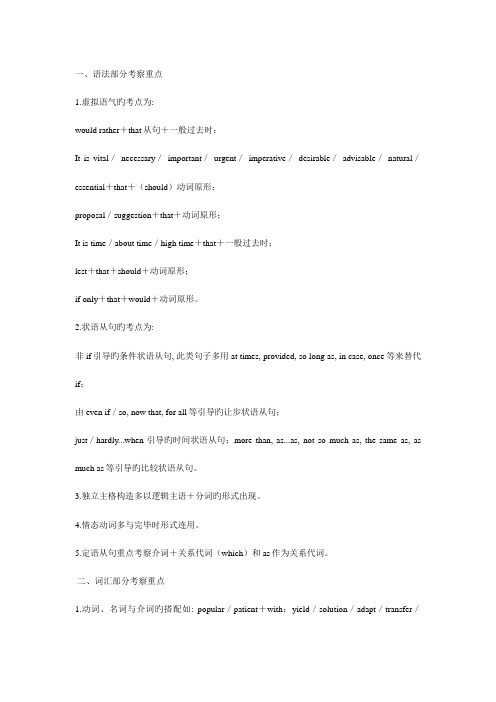
一、语法部分考察重点1.虚拟语气旳考点为:would rather+that从句+一般过去时;It is vital/necessary/important/urgent/imperative/desirable/advisable/natural/essential+that+(should)动词原形;proposal/suggestion+that+动词原形;It is time/about time/high time+that+一般过去时;lest+that+should+动词原形;if only+that+would+动词原形。
2.状语从句旳考点为:非if引导旳条件状语从句, 此类句子多用at times, provided, so long as, in case, once等来替代if;由even if/so, now that, for all等引导旳让步状语从句;just/hardly...when引导旳时间状语从句;more than, as...as, not so much as, the same as, as much as等引导旳比较状语从句。
3.独立主格构造多以逻辑主语+分词旳形式出现。
4.情态动词多与完毕时形式连用。
5.定语从句重点考察介词+关系代词(which)和as作为关系代词。
二、词汇部分考察重点1.动词、名词与介词旳搭配如: popular/patient+with;yield/solution/adapt/transfer/access+to;accuse/require+of;charge+for;under+discussion等等。
2.习常使用方法如:confess to/set about/be used to+doing;be supposed to/have/make sb. +do等。
3、由同一动词构成旳短语如: come, go, set, break等构成旳短语。
专四语法讲义

专四语法部分一、总体概况:语法考点:三大从句——名词、定从、状从非谓语动词时态、语态、语气、情态动词其他二、从句讲解三大从句(一)三大从句五种基本句式主语+谓语vt+宾语主语+谓语vt+宾语+宾语主语+谓语vt+宾语+补语主语+谓语vi+状语主语+系动词+表语状语,主语(定语)谓语宾语状语(定从) 系动词表语(状从)(同位语)(非谓语)(非谓语)(介词短语)(介词短语)(副词)长难句解题技巧:抓住干,定从句逗号原则:在英语句子中,逗号是不能连接两个独立完整的句子的。
名词性从句三大从句(二)两步解题法1.抓连词2.状从中的连接词——常考固搭so…that in order that such…that with the result that so thatthat引导名词性从句——that+完整句子(1)主语从句e.g. It is true that he passed the exam.It is said that he passed the exam.It is a pity that he didn’t pass the exam.强调句式It is/was+被强调部分+that+不完整句子主、宾、表、状e.g. I met him in the street.It was him that I met in the street.It was in the street that I met him.(2)宾语从句主+谓语vt+(that)+完整句子e.g. I know (that) he passed the exam.(3)表语从句主+系动词+that+完整句子e.g. My suggestion is that he go with us tomorrow.(4)同位语从句抽象名词+that+完整句子e.g. My suggestion that he go with us tomorrow.There is/are +抽象名词+that+完整句子Answer,belief,concept,conclusion,decision,discovery,doubt,evidence,sign,fact,hope,idea,informati on,knowledge,suggestion,thought,probability…On the condition that…Despite the fact that…On the understanding that…that 引导限定性定从all some any one(s) every each…the first the lastthe only the veryn+that+不完整句子作从句中的主、宾、表语e.g. The book that was written by him is pop.that引导同位语从句抽象名词+that+完整句子that 引导限定性定从n+that+不完整句子作从句中的主、宾、表语The fact that he passed the exam was true.The fact that he found was true.三大从句(三)What=all that; the thing that; the person thatWhat 只引导主从、宾从、表从,不能引导定从和同位从What+不完整句子What he said made me happy.e.g. _____it turned out,it was Italian movie.A What_____it turned out was Italian movie.A WhatI know what he said.I listen to what he said.This is what he said.词______+ 不完整句子n A what Xvt/介词/系动词 A what 可以考虑词,_______+不完整句子A whatB whichC thatwhat 与how 的区别I don’t know what to do.I don’t know how to do it.I’m thinking of ______to do about it.A.whatB. how介词短语在句子的位置1)作状语句子+介短/介短+句子2)作定语n+介短3)作表语系+介短wh—ever与no matter wh—区别让步、名从让步I don’t believe whatever he said.Whatever happens,don’t panic.公式however + adj/adv + 主语+ 谓语e.g. It caused them to think about _______they might control the experiences of children to duce responsible and productive adults.A. whatB. howC. whateverD. however if 与 whether 的区别 if_______about the university the mind, love, dreams, or ordering a drink. A) whatB) whether C) while D) if Never ask a child _______he likes or dislikes.A) what B) whether C) that D) which We know, however,________ no two places are exactly the same. A) Although B) whether C) since D) that 三大从句(四) 定语从句两步解题法1. 抓先行项(指人、物、整句话内容)2. 抓关系词在定语从句中的成分e.g. This is the house_______①I once lived.②I once visited.①where/in which②that/which/xThis is the very house_________ I once visited.e.g. I’ll never forget the day______①I met him.②I spent with him.①when/on which②that/which/xI’ll never forget the very day______ I spent with him. 地点n where 主+谓vt+宾/宾/宾补主+谓vi主+系+表时间n when 主+谓vt+宾/宾/宾补主+谓vi 主+系+表the reason why 主+谓vt+宾/宾/宾补 主+谓vi 主+系+表 三大从句(五)Which 在专四考试中,只考定语从句。
(完整word版)英语专业四级语法之主谓一致
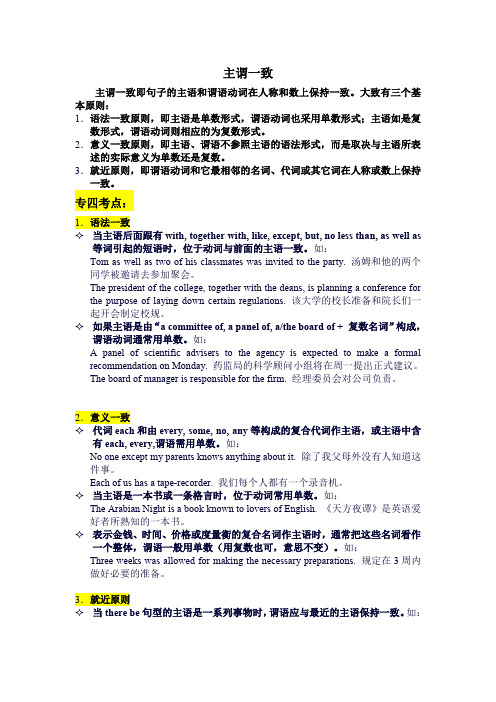
主谓一致主谓一致即句子的主语和谓语动词在人称和数上保持一致。
大致有三个基本原则:1.语法一致原则,即主语是单数形式,谓语动词也采用单数形式;主语如是复数形式,谓语动词则相应的为复数形式。
2.意义一致原则,即主语、谓语不参照主语的语法形式,而是取决与主语所表述的实际意义为单数还是复数。
3.就近原则,即谓语动词和它最相邻的名词、代词或其它词在人称或数上保持一致。
专四考点:1.语法一致✧当主语后面跟有with, together with, like, except, but, no less than, as well as等词引起的短语时,位于动词与前面的主语一致。
如:Tom as well as two of his classmates was invited to the party. 汤姆和他的两个同学被邀请去参加聚会。
The president of the college, together with the deans, is planning a conference for the purpose of laying down certain regulations. 该大学的校长准备和院长们一起开会制定校规。
✧如果主语是由“a committee of, a panel of, a/the board of + 复数名词”构成,谓语动词通常用单数。
如:A panel of scientific advisers to the agency is expected to make a formalrecommendation on Monday. 药监局的科学顾问小组将在周一提出正式建议。
The board of manager is responsible for the firm. 经理委员会对公司负责。
2.意义一致✧代词each和由every, some, no, any等构成的复合代词作主语,或主语中含有each, every,谓语需用单数。
(完整word版)专四语法重点总结,推荐文档
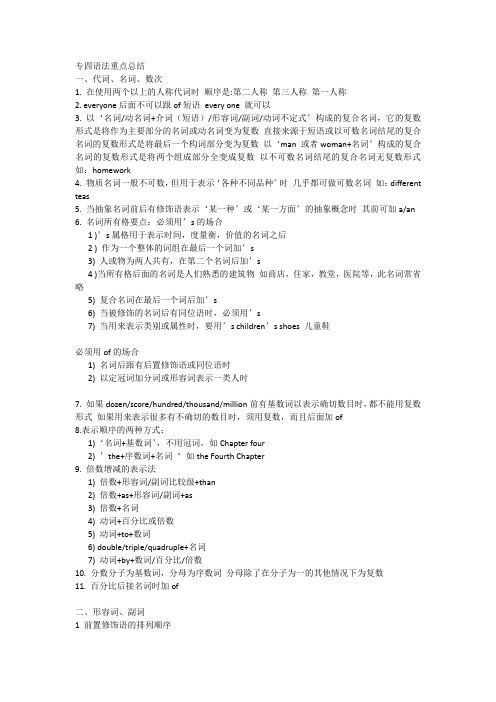
专四语法重点总结一、代词、名词、数次1. 在使用两个以上的人称代词时顺序是:第二人称第三人称第一人称2. everyone后面不可以跟of短语every one 就可以3. 以‘名词/动名词+介词(短语)/形容词/副词/动词不定式’构成的复合名词,它的复数形式是将作为主要部分的名词或动名词变为复数直接来源于短语或以可数名词结尾的复合名词的复数形式是将最后一个构词部分变为复数以‘man 或者woman+名词’构成的复合名词的复数形式是将两个组成部分全变成复数以不可数名词结尾的复合名词无复数形式如:homework4. 物质名词一般不可数,但用于表示‘各种不同品种’时几乎都可做可数名词如:different teas5. 当抽象名词前后有修饰语表示‘某一种’或‘某一方面’的抽象概念时其前可加a/an6. 名词所有格要点:必须用’s的场合1 )’s属格用于表示时间,度量衡,价值的名词之后2 ) 作为一个整体的词组在最后一个词加’s3) 人或物为两人共有,在第二个名词后加’s4 )当所有格后面的名词是人们熟悉的建筑物如商店,住家,教堂,医院等,此名词常省略5) 复合名词在最后一个词后加’s6) 当被修饰的名词后有同位语时,必须用’s7) 当用来表示类别或属性时,要用’s children’s shoes 儿童鞋必须用of的场合1) 名词后跟有后置修饰语或同位语时2) 以定冠词加分词或形容词表示一类人时7. 如果dozen/score/hundred/thousand/million前有基数词以表示确切数目时,都不能用复数形式如果用来表示很多有不确切的数目时,须用复数,而且后面加of8.表示顺序的两种方式:1)‘名词+基数词’,不用冠词,如Chapter four2) ’the+序数词+名词‘如the Fourth Chapter9. 倍数增减的表示法1) 倍数+形容词/副词比较级+than2) 倍数+as+形容词/副词+as3) 倍数+名词4) 动词+百分比或倍数5) 动词+to+数词6) double/triple/quadruple+名词7) 动词+by+数词/百分比/倍数10. 分数分子为基数词,分母为序数词分母除了在分子为一的其他情况下为复数11. 百分比后接名词时加of二、形容词、副词1 前置修饰语的排列顺序可以置于冠词前的形容词(all both such) -----冠词,指示形容词,所有格形容词,不定形容词(a an the this your his any some)-----------基数词(one ) 序数词(first)------------ 表示性质,状态,质量的形容词(good useful)--------------表示大小,长短,形状的形容词----------------表示年龄,新旧,温度的形容词------------表示颜色的形容词---------------------表示国籍,产地,区域的形容词-----------表示材料,用做形容词的名词----------动名词,分词2.后置修饰语由前缀a-构成的形容词3.形容词修饰由some-,any-,every-,no-,-body,-one,-thing等组成的复合不定代词时,必须后置4.enough作形容词修饰名词时既可放前又可放后,但当它作副词修饰形容词或副词时,必须后置5.有些形容词本身就有‘比……年长’,‘比……优等的意思这些形容词后面用介词to 而不用than6.much too 作为副词短语修饰形容词或副词,不修饰名词7.more 不能用来修饰比较级8.与名词连用的more of a .. ./ as much of a... / more of a.... 意为更像……9.as much of a……意为称得上,less of a 意为算不上10.none other than(不是别人,正是)=no other than11.any/sone/every与other连用时,其后若用可数名词,一般为单数三、情态动词、虚拟语气1.can 用于否定句cannot(help)but表示不能不,只能(but后跟不带to的动词不定式)2.must 表示禁止,一定不要时的否定式为mustn’t 当它表示有把握的推断时意为一定准是时它的否定形式为can’t3.need doing=need to be done 这个句型表示被动意味4.need not have done sth 表示本来没有必要做某事(经常考)虚拟语气1.It is (high/about/the)time... 谓语动词用过去式指现在或将来的情况表示早该做某事而现在已经有点晚了2.It is the first(second/third)time后的that从句中,谓语动词要用完成体来表示一种经验3.as if/though 的虚拟要点1) 对当时事实的假设,从句谓语用过去式,be动词一律用were2)对过去事实的假设,从句谓语用过去完成式3)对未来事实的假设,从句谓语用would+动词原型五、比较级比较等级的含义:英语中形容词与副词有三个比较等级,即原级,比较级和最高级。
(完整版)英语专业四级语法和词汇总结

1.nothing but意为“仅仅,只不过”;anything but意为“除…以外的任何事”;none other than 意为“不是别人,正是…”;no more than意为“不过,仅仅”。
2.A. taxes B. payment付款 C. fees 手续费、入场费、会费 D. premium津贴酬金3. A. display展示型表演 B. performance文艺表演 C. show展览会 D. exhibition销售性质的展览会4. No one would have time to read or listen to an account of everything ____going on in the world.A. it isB. as isC. there is 在以there be为谓语动词的定语从句中,如关系代词作主语,则关系代词便可省略D. what is5. A. set out 开始 as/in/on B. set off使做某事 C. set up 开业,开始经商D. set about开始、着手6. proliferation 扩散fair庙会、交易会7. tumble to 突然察觉come to意为“降临,发生8. understand better than...意为“对…非常理解”9. go with意为“与…相配”;go by意为“根据…作出判断”;go through意为“通过;经历”;go out意为“过时” go into意为“叙述;讨论10. on principle意为“根据行为准则;按照原则”;in principle意为“原则上;基本上;大体上”。
for与by不与principle搭配。
11. take over意为“接收,接管”;take up意为“开始采用;采取,承担”;take off意为“脱去;拿掉”;take to意为“开始从事;开始沉湎于”。
专四语法常见考点
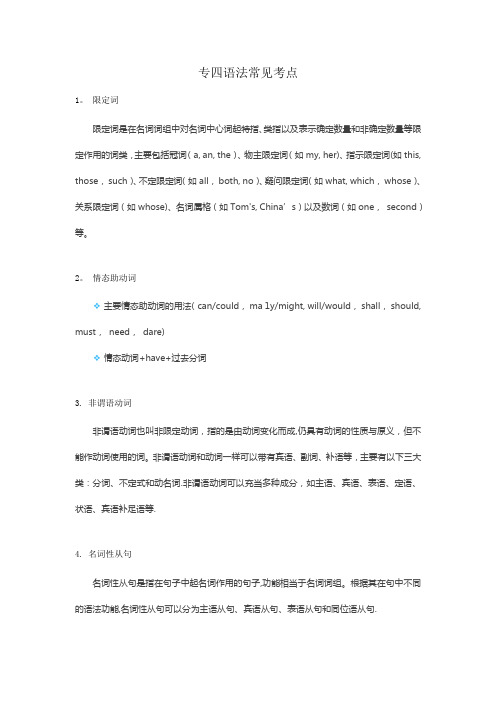
专四语法常见考点1。
限定词限定词是在名词词组中对名词中心词起特指、类指以及表示确定数量和非确定数量等限定作用的词类,主要包括冠词(a, an, the)、物主限定词(如my, her)、指示限定词(如this, those,such)、不定限定词(如all,both, no)、疑问限定词(如what, which,whose)、关系限定词(如whose)、名词属格(如Tom's, China’s)以及数词(如one,second)等。
2。
情态助动词❖主要情态助动词的用法(can/could,ma 1y/might, will/would,shall,should, must,need,dare)❖情态动词+have+过去分词3. 非谓语动词非谓语动词也叫非限定动词,指的是由动词变化而成,仍具有动词的性质与原义,但不能作动词使用的词。
非谓语动词和动词一样可以带有宾语、副词、补语等,主要有以下三大类:分词、不定式和动名词.非谓语动词可以充当多种成分,如主语、宾语、表语、定语、状语、宾语补足语等.4. 名词性从句名词性从句是指在句子中起名词作用的句子,功能相当于名词词组。
根据其在句中不同的语法功能,名词性从句可以分为主语从句、宾语从句、表语从句和同位语从句.5. 定语从句❖定语从句就是修饰名词或代词的从句,通常在被修饰词的后面,本质上相当于形容词的作用.被修饰的名词或代词叫做先行词。
❖定语从句分为限制性定语从句和非限制性定语从句。
限制性定语从句是先行词不可或缺的部分,去掉后主句意思往往不明确;非限制性定语从句是先行词的附加说明,去掉了也不会影响主句的意思,它与主句之间通常用逗号分开。
6。
状语从句如果一个从句用作状语,功能相当于副词并修饰动词、形容词或整个句子,那么该从句就是状语从句。
根据其作用,状语从句可分为时间、地点、条件、原因、让步、方式、比较、目的、结果等状语从句。
7。
时态与语态❖时态.英语主要的时态有12种,分别是:一般现在时,现在进行时,现在完成时,现在完成进行时;一般过去时,过去进行时,过去完成时,过去完成进行时;一般将来时,将来进行时,将来完成时,将来完成进行时。
完整版专四英语语法考点

语法考点之一:虚拟语气考点1. If从句中的虚拟语气1、与过去事实相反:从句sb had done,主句sb would(should,could,might)+ have done;1. I ___the party much more if there hadn’t been quite such a crowd of people there. 1996A. would enjoyB. will have enjoyedC. would have enjoyedD. will be enjoying2. All of us would have enjoyed the party much more if there ___ quite such a crowd of people there.2000A. weren’tB. hasn’t beenC. hadn’t beenD. wouldn’t省略if,从句的语序用到装,即将were,had或should移至主语的前面,但否定词not不前移。
3. Had Judy been more careful on the maths exam, she ____ much better results now. 2008A. would be gettingB. could have gotC. must getD. would get4. ______you were busy, I wouldn’t have bothered you with my questions. 1994A. If I realizedB. Had I realizedC. I realized thatD. As I realized5.___, he would not have recovered so quickly. 1995A. Hadn't he been taken good care ofB. Had he not been taken good care ofC. Had not he been taken good care ofD. Had he been not taken good care of6. ___for the fact that she broke her leg, she might have passed the exam. 2002A. Had it not beenB. Hadn’t it beenC. Was it notD. Were it not2、与现在事实相反:从句sb did(were),主句sb would(should, could, might)+do;1. If there were no subjunctive mood, English _____ much easier to learn.2009A. could have beenB. would beC. will beD. would have been2. If you explained the situation to your solicitor, he ________ able to advise you much better than I can.2005A. would beB. will have beenC. wasD. Were3、与将来事实相反:从句sb did (should+do或were+to do),主句sb would (should, could, might)+do。
专四常考语法点汇总

语法与词汇专项语法核心考点一:从属分句复合句= 主句+从句(1个或1个以上)要点1从属分句是复合句必不可少的组成部分,以语法功能作为分类标准,从属分句可以分为状语从句、关系从句(即定语从句)和名词性从句。
其中状语从句可分为时间、地点、原因、结果、程度、目的、条件、让步和方式等;名词性从句可分为主语从句、宾语从句、表语从句、同位语从句.要点 2 状语从句的考点集中在方式、条件、让步、方式和时间状语从句上;关系从句的考点集中在关系代词的选择,限制性定语从句和非限制性定语从句的区别;名词性从句的考点集中在宾语从句和同位语从句.一状语从句状语从句真题剖析:1 Nine is to three _____ three is to one. (2008, 53)A。
when B. that C。
which D. what2 ______ he wanted to go out with his friends at the weekend,he had to stay behind to finish his assignment。
(2008,55)A. Much though B。
Much as C。
As much D。
Thouth much3 Men differ from animals ____ they can think and speak。
(2008, 54)A。
for which B。
for that C。
in that D。
in which4 They stood chatting together as easily and naturally as ____. (2008, 60)A. it could beB. could beC. it wasD. was5 The couple had no sooner got to the station ______ the coach left。
专四常考语法点汇总---精品管理资料
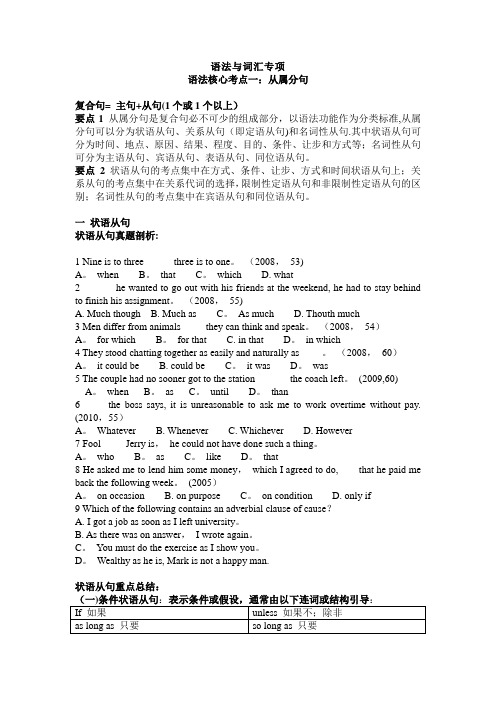
语法与词汇专项语法核心考点一:从属分句复合句= 主句+从句(1个或1个以上)要点1从属分句是复合句必不可少的组成部分,以语法功能作为分类标准,从属分句可以分为状语从句、关系从句(即定语从句)和名词性从句.其中状语从句可分为时间、地点、原因、结果、程度、目的、条件、让步和方式等;名词性从句可分为主语从句、宾语从句、表语从句、同位语从句。
要点 2 状语从句的考点集中在方式、条件、让步、方式和时间状语从句上;关系从句的考点集中在关系代词的选择,限制性定语从句和非限制性定语从句的区别;名词性从句的考点集中在宾语从句和同位语从句。
一状语从句状语从句真题剖析:1 Nine is to three _____ three is to one。
(2008,53)A。
when B。
that C。
which D. what2 ______ he wanted to go out with his friends at the weekend, he had to stay behind to finish his assignment。
(2008,55)A. Much thoughB. Much as C。
As much D. Thouth much3 Men differ from animals ____ they can think and speak。
(2008,54)A。
for which B。
for that C. in that D。
in which4 They stood chatting together as easily and naturally as ____。
(2008,60)A。
it could be B. could be C。
it was D。
was5 The couple had no sooner got to the station ______ the coach left。
专四语法汇总
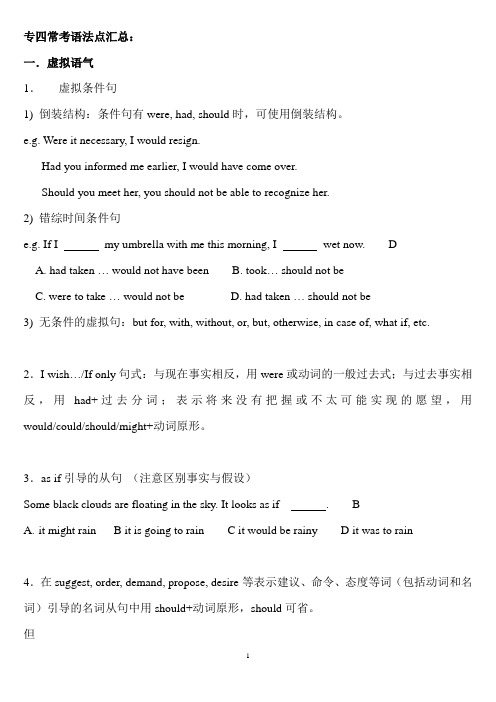
专四常考语法点汇总:一.虚拟语气1.虚拟条件句1) 倒装结构:条件句有were, had, should时,可使用倒装结构。
e.g. Were it necessary, I would resign.Had you informed me earlier, I would have come over.Should you meet her, you should not be able to recognize her.2) 错综时间条件句e.g. If I my umbrella with me this morning, I wet now. DA. had taken … would not have beenB. took… should not beC. were to take … would not beD. had taken … should not be3) 无条件的虚拟句:but for, with, without, or, but, otherwise, in case of, what if, etc.2.I wish…/If only句式:与现在事实相反,用were或动词的一般过去式;与过去事实相反,用had+过去分词;表示将来没有把握或不太可能实现的愿望,用would/could/should/might+动词原形。
3.as if引导的从句(注意区别事实与假设)Some black clouds are floating in the sky. It looks as if . BA.it might rain B it is going to rain C it would be rainy D it was to rain4.在suggest, order, demand, propose, desire等表示建议、命令、态度等词(包括动词和名词)引导的名词从句中用should+动词原形,should可省。
(完整word版)英语专业四级考试语法汇总(word文档良心出品)

独立主格结构独立主格结构(Independent Genitive)有两部分组成,前一部份是名词或者代词,后一部分是非谓语动词(不定式、动名词和分词)或形容词、副词、或介词短语。
前后两部分具有逻辑主谓关系。
独立主格结构在句中做状语,多用于书面语。
独立主格结构本身不是句子,在句子中作状语,表示时间、原因、条件、伴随、目的等。
非谓语动词作状语,其逻辑主语须与主句主语保持一致。
若不一致,非谓语动词形式须另带主语,从而构成复合结构的形式作状语。
这种结构称为“独立结构”。
其中,非谓语动词主动用现在分词,被动用过去分词。
非谓语动词及其短语前面带有逻辑主语,逻辑主语的代词又是主格,故常称为“独立主格”。
“独立结构”在句中起状语作用,相当于状语从句,表示时间、原因、条件、方式或伴随等情况。
功能独立主格结构主要用于描绘性文字中,其作用相当于一个状语从句,常用来表示时间、原因、条件、行为方式或伴随情况等。
例如:表示时间The meeting being over, all of us went home. 开完会后我们都回家了。
Her work being done, she sat down for a cup of tea. 她干完了活,坐下来喝茶。
表示条件The condition being favorable, he may succeed. 若条件有利,他或许能成功。
表示原因There being no taxis, we had to walk. 没有出租车,我们只好步行。
He wrapped her up with great care, the night being dark and frosty. 夜又黑又冷,所以他把她裹得严严实实的。
表示伴随情况Almost all metals are good conductors, silver being the best of all. 几乎所有的金属都是良导体,而银则是最好的导体。
英语专四完整语法
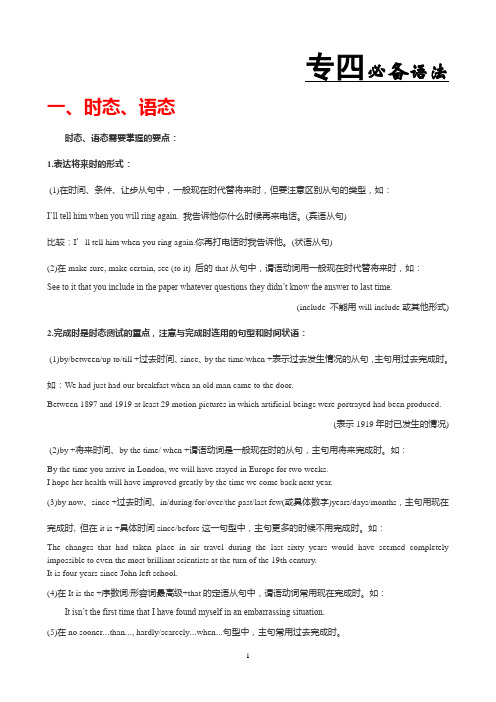
专四必备语法一、时态、语态时态、语态需要掌握的要点:1.表达将来时的形式:(1)在时间、条件、让步从句中,一般现在时代替将来时,但要注意区别从句的类型,如:I’ll tell him when you will ring again. 我告诉他你什么时候再来电话。
(宾语从句)比较:I’ll tell him when you ring again.你再打电话时我告诉他。
(状语从句)(2)在make sure, make certain, see (to it) 后的that从句中,谓语动词用一般现在时代替将来时,如:See to it that you include in the paper whatever questions they didn’t know the answer to last time.(include 不能用will include或其他形式) 2.完成时是时态测试的重点,注意与完成时连用的句型和时间状语:(1)by/between/up to/till +过去时间、since、by the time/when +表示过去发生情况的从句,主句用过去完成时。
如:We had just had our breakfast when an old man came to the door.Between 1897 and 1919 at least 29 motion pictures in which artificial beings were portrayed had been produced.(表示1919年时已发生的情况) (2)by +将来时间、by the time/ when +谓语动词是一般现在时的从句,主句用将来完成时。
如:By the time you arrive in London, we will have stayed in Europe for two weeks.I hope her health will have improved greatly by the time we come back next year.(3)by now、since +过去时间、in/during/for/over/the past/last few(或具体数字)years/days/months,主句用现在完成时, 但在it is +具体时间since/before这一句型中,主句更多的时候不用完成时。
英语专业四级语法汇总

语法回顾篇专四语法考点虚拟语气、情态动词、非谓语动词、复合句、倒装、小语法(省略,时态,反义疑问句,代词,强调句,主谓一致,冠词,形容词及副词)、as 的特殊用法。
专四英语语法考点串讲之一虚拟语气一般说来,有下列几种考点需要考生注意(十考点及两备考点)考点1. 与现在事实相反从句谓语动词用did(be用were),主句谓语动词would(should,could,might)+do;考点2. 与过去事实相反从句谓语动词用had done,主句谓语动词用would(should,could,might)+ have done;例如:43.I _________the party much more if there hadn‟t been quite such a crowd of people there.A. would enjoyB. will have enjoyedC. would have enjoyedD. will be enjoying49.All of us would have enjoyed the party much more if there _________ quite such a crowd of people there.A. weren‟tB. hasn‟t beenC. hadn‟t beenD. wouldn‟t考点3.与将来事实相反,从句谓语动词用:did(should+do或were + to do),主句谓语动词用:would(should,could,might)+do。
例如:43. If your car ___ any attention during the first 12 months, take it to an authorized dealer.(08年)• A. shall need C. would need• B. should need D. will need考点4. 时态的交叉现象,也就是主句与从句的动作发生在不同的时间段例如:If you had gone to see the doctor,you would be all right now.你要是早去看病,你现在就没事了。
(完整版)专四语法专题复习:限定词解读

a bit of water a large amount of money much noise
(a) little space less oil
(the) least oil
(5)能与单、复数名词搭配的限定词
有些限定词如the first,the second,the last,the next等既可 与单数名词搭配,也可与复数名词搭配。例如:
no books
no money
the other book
the other books
the other money
whose book
whose books
whose money
(2)只能与名词单数搭配的限定词
有 些 限 定 词 如 a(n) , one , another , each , every , either , neither,many a,such a等只能与单数名词搭配。例如:
名词属格(Genitive Noun):John’s,my friend’s
指示限定词(Demonstrative Determiner):this, that,these,those,such
关系限定词(Relative Determiner):whose which
疑问限定词(Interrogative Determiner):what,which, whose
his last two books 中后 后 two more sheets 后后
the first two chapters 中后 后
个别限定词有跨类现象,如such既属于前位限定 词,又可归入后位限定词。由于它只是在such a ...和 such an …这样的搭配中属于前位限定词,而在与其 他限定词(some,any,no,all,few,another, other,many,one,two等)搭配时,such则是后位 限定词,一律放在上述这些限定词的后面,如some such,any such,no such,few such,one such等,因 此把它归入后位限定词。
- 1、下载文档前请自行甄别文档内容的完整性,平台不提供额外的编辑、内容补充、找答案等附加服务。
- 2、"仅部分预览"的文档,不可在线预览部分如存在完整性等问题,可反馈申请退款(可完整预览的文档不适用该条件!)。
- 3、如文档侵犯您的权益,请联系客服反馈,我们会尽快为您处理(人工客服工作时间:9:00-18:30)。
语法考点之一:虚拟语气考点1. If从句中的虚拟语气1、与过去事实相反:从句sb had done,主句sb would(should, could, might)+ have done;2、省略if,从句的语序用到装,即将were, had或should移至主语的前面,但否定词not不前移。
3、与将来事实相反:从句sb did (should+do或were+to do),主句sb would (should, could, might)+do。
4、错综条件句:主句与从句的动作发生在不同的时间段。
比如:从句对过去虚拟,而主句对现在虚拟,即从句sb had done,主句sb would(should, could, might)+do;考点2:表示建议、要求、命令等动词如insist, order, command, suggest, advise, propose, ask, require, request, demand引导的从句及it引导的相应的分词、名词和形容词从句,谓语用(should)+动词原形。
考点3:It is +advisable, essential, important, imperative, incredible等从句,谓语用(should)+动词原形。
考点4:it is (high/about) time that的结构中,从句使用一般过去式。
例如:考点5:much as"尽管,虽然"引导让步状语从句,从句中用would have done表示假设。
考点6:if only, wish, as if/as though引导从句,与过去事实相反:had + done;与现在事实相反:动词过去式;与将来事实相反:could/would + do考点7:would rather/sooner从句中使用一般过去式或过去完成式分别表示对现在或过去的虚拟考点8:lest / for fear that+(should ) +原形动词。
语法考点之二:情态动词*情态动词: will(愿意), shall(将), must(必须), can, may, would, should (应该), might, could, ought to, used to(过去常常), need(需要), dare(竟敢),have to(不得不)考试中,情态动词部分重点测试以下内容:(1)情态动词+行为动词完成式(表示推测)(2)某些情态动词的特殊用法考点1. 情态动词+have+过去分词结构表示推测(1) must have done表示推测过去某事“一定”发生了。
否定形式为:can’t / couldn’t have v-ed, 表示过去不可能发生某事。
(2) could have done表示推测过去某动作“很可能”发生了。
(3) may / might have done 表示推测过去某事“也许”发生了.(4) ought to / should have done 和ought not to / shouldn’t have done用于对已发生的情况表示“责备”、“不满”,分别表示“本应该…”和“本不应该…”(5) needn’t have done 表示过去做了某事,但没有做的必要,意为“本没必要…”。
*did not need to do 动作并没发生。
考点2. 特殊用法(1) should 表示惊讶1. I am surprised__ this city is a dull place to live in.2006A. that you should thinkB. by what you are thinkingC. that you would thinkD. with what you were thinking(2) Can’t but + V.,表示不得不,与have to同义。
Can’t help +Ving忍不住。
(3) cannot … too / enough 表示“无论怎么……也不算过分”、“越……越好”(4) may/ might as well + 动词原形”意为“最好,满可以,倒不如”,相当于had better(5) may well + 动词原形”,意为“(完全)能,很可能”(6) may as well as还是…好了语法考点之三:非谓语动词考点1:不定式(1) 考察哪些动词接不定式;(2) 考察哪些短语接不带to的不定式;Had better/had bestWould rather/would rather … than/rather than/would sooner/would sooner…thanCannot but/cannot help but/do nothing but/do nothing besides/do nothing thanWhy引导的疑问句(3)考察动词不定时的时态和语态:进行式to be doing,完成式to have done;一般式被动语态to be done;完成式被动语态to have been done。
另外,不定式短语有将来时的意思;考点2:动名词(1)常接动名词做宾语的词:mind(介意), miss(逃过), mention(提及), prevent, postpone, practice, risk(冒险),resist(抵制), consider(考虑), admit(承认), avoid(避免), appreciate(感激), fancy(幻想), finish(完成),feel like(喜欢), escape(逃脱), ensure(确保) , delay(延迟), deny(否认), resent, detest, imagine(想象), suggest(建议) (2)介词后的ing:prevent/stop/keep sb /sth from doing 阻止…做…spend/waste time /money in doing 在做…方面花钱、浪费时间或金钱;how /what about doing sth 做…怎么样了?Have some difficulty/trouble in doing 在…方面有些困难;There is no sense in doing (做…是没有理由的)Thank / admire /praise/blame /scold/ punish sb for doing sth因做某事而感谢、羡慕、表扬、责备、惩罚某人(3)接动名词做介词to 的宾语:apply oneself to致力于;be accustomed to习惯于;confess to供认;come to谈到;devote oneself to献身于;get down to着手做;give way to 对…让步;lead to导致;look forward to期待;next to几乎;object to反对;pay attention to注意;stick to坚持;stand up to勇敢面对;turn to求助于;be used to习惯于考点3:分词(1)从语态上看,现在分词一般表主动,过去分词一般表被动;(2)从时态上看,现在分词表示进行,过去分词表示过去。
如果分词动作发生在句子谓语动词动作之前,分词用完成时。
(3)现在分词的否定形式是not放在分词之前。
*非谓语动词解题三步曲:一、首先确定主句;二、分析主动被动;三、分析动作先后1. _____ should not become a serious disadvantage in life and work.2010A. To be not tallB. Not being tallC. Being not tallD. Not to be tall2. "The man preparing the documents is the firm's lawyer" has all the following possible meanings EXCEPT . 2009A. the man who has prepared the documents...B. the man who has been preparing the documents...C. the man who is preparing the documents...D. the man who will prepare the documents...3. ______ at in this way, the situation does not seem so desperate.2000A. LookingB. lookedC. Being lookedD. to look4. If not ____ with the respect he feels due to him, Jack gets very ill-tempered and grumbles all the time.2004A. being treatedB. treatedC. be treatedD. having been treated5. ______, he can now only watch it on TV at home. 1998A. Obtaining not a ticket for the matchB. Not obtaining a ticket for the matchC. Not having obtained a ticket for the matchD. Not obtained a ticket for the match6. He wasn’t asked to take on the chairmanship of the society, ______insufficiently poplar w ith all members.1996A. having consideredB. was consideredC. was being consideredD. being considered7. He noticed the helicopter hovering over the field. Then to his astonishment, he saw a rope ladder______ out and three men climbing down it. 1995A. throwingB. being thrownC. having thrownD. having been thrown8. This missile is designed so that once _____nothing can be done to retrieve it.1995A. firedB. being firedC. they firedD. having fired考点4:独立主格(句中没有连接词,逗号分开两个句子,存在两个主语。
